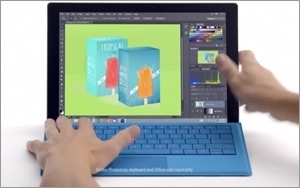 Microsoft, which got a new CEO in Satya Nadella last year, is going through massive changes. And that is especially true of the Redmond, Wash. company's marketing.
Microsoft, which got a new CEO in Satya Nadella last year, is going through massive changes. And that is especially true of the Redmond, Wash. company's marketing.
The company's CMO, Chris Capossela, spoke at the Association of National Advertisers’ Masters of Marketing conference in Orlando, Fla. on Thursday about how the company is making
Microsoft a consumer brand. And, he said, the new leadership is much less top-down and more "reverse mentoring" -- with ideas coming up from the middle of the company.
The
company is focusing on a "freemium" strategy of cultivating a huge consumer base and then offering upgraded pay-to-play options both on the consumer and the enterprise sides of the business.
"As strong as brands like Xbox and Windows are, the Microsoft brand is incredibly powerful," he said. "When someone knows a product is built by Microsoft, purchase intent goes up 14
points. We will lean into that much more going forward." Thus, what used to be Windows Azure is now a Microsoft sub-brand. And, he said, the Nokia phone running Windows will be branded
Microsoft.
advertisement
advertisement
And it's not about the toys per se. "The key differentiators are productivity and platform," he said. "It's not really about cool gadgets, but cool things you get
to do with what we've created. That's a key distinction." That makes sense if one considers the company's origins as a software company, enabled by hardware, and invisible to the end user.
Broadly speaking, it's about building marketing right into Microsoft products, modern storytelling, and ad platforms, not ad campaigns, per Capossela. And using its huge cloud capacity
to offer those free services is key. "We are betting hugely on this, we want to innovate in this area. Every new high-tech business, every cloud service uses a 'freemium' to some extent."
He said the model, aligning with the idea that the product itself becomes a marketing channel, gets as many people as possible engaged in the product or service. "So product becomes the
core that becomes incredibly important to consumers. And our best marketing comes from our fans. We want to learn to cultivate Xbox fans, for instance, and then find ways to monetize a subset of the
user base. That monetization is a small percent."
His example is startup Prezi, which offers a free Powerpoint-type product. The only catch -- if it's a catch -- is that one's
presentations are public. And they monetize privacy by offering low monthly payment for an eyes-only product.
For Microsoft, he said, Skype has a quarter of the world's
international phone calls, 310 million users and it's free. "But we have an enterprise version called Lync, with 100 million users. So the notion of consumer freemium to enterprise paid is another
model. You're focusing on deep engagement instead of just the sale."
He said Microsoft is continuing to work on building marketing into products, because it saves money. "I
have far too many products to market all of them. I'd rather market one thing and have it naturally flow and lead to another." Thus, with Windows phone, "If you take a photo, we store it in OneDrive
[cloud-based platform]. It's free and you have to do nothing, and if you lose your phone, you haven't lost the photos. We have turned you into a OneDrive user.”